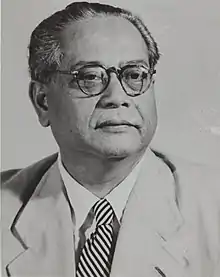Tengku Mansur
Tengku Mansur or Tengku Mansoer (17 January 1897 - 6 October 1953) was the Wali Negara of East Sumatra, as part of the United States of Indonesia. He was also a founding figure and Chairman of Jong Sumatranen Bond (1917-1919).[1]
Tengku Mansur | |
|---|---|
 | |
| Wali Negara of Sumatera Timur | |
| In office 28 January 1948 – 17 August 1950 | |
| President | Sukarno |
| Preceded by | Position created |
| Succeeded by | Position abolished |
| Personal details | |
| Born | January 17, 1897 |
| Died | October 6, 1953 (aged 56) Medan, Indonesia |
| Nationality | Indonesian |
| Spouse | Siti Akmal (Amalia Gezina Wempe) |
| Children | 2 |
| Alma mater | STOVIA Leiden University |
Biography

Tengku Mansur was born in Tanjungbalai, Sultanate of Asahan, 17 January 1897. He was the son of Tengku Muhammad Adil (Tengku Babul) and Raden Ayu Sariah (originally from Cianjur).[2] Tengku Muhammad Adil and his brothers were known to be very vigorous in opposing and fighting the Dutch. Until in 1859 Tengku Muhammad Adil was banished by the Dutch to Buitenzorg (Bogor) to stop his resistance. His father married four wives and had 12 children.[3]
Mansur was part of a noble family, as Sultan Saibon (Sultan of Asahan) was his nephew.[4]
Mansur started his higher education at the Inlandsch Artsen School (STOVIA) in Batavia in 1911. Mansur is noted as the only student with the title Tengku at that time. In the same class as Mansur (first year) was Abdoel Moenir Nasution. Their classmate in second year (entered 1910) was Ma'moer Al Rasjid Nasution. In third year (entered 1909) were Sjoeib Paroehoeman Harahap and Soeleman Hasiboean.[5]
He began to organise and joined nationalist youths and they founded the Jong Sumatranen Bond organisation of which he was elected chairman (1917).[5] He continued his studies at Leiden University in the Netherlands.
While studying in Leiden, he married a Dutch woman named Amalia Gezina Wempe (1893-1967).[4] His wife later changed her name to Siti Akmal.[6]
From that marriage, Mansur was blessed with a pair of children. The first child was a daughter named Tengku Sariah who was born in Leiden, 14 January 1925 and died in Medan, 15 April 1994.[7] The second son, Tengkoe Dr Adil Mansoer, was born in Leiden, 24 April 1927 and died in The Hague, 30 November 1979.[8]
After obtaining his medical degree in the Netherlands, Tengku Mansur worked as a surgeon in Medan. In November 1947, he was appointed Wali Negara of East Sumatra.[9]
Awards
His name is immortalised as a street name in Medan and the name of a public hospital in Tanjungbalai.
Bibliography
References
- "Indonesia States 1946-1950".
- "Tengku Mansur". geni_family_tree. Retrieved 2023-05-09.
- "Tengku Tengku Muhammad Adil [Tengku Babul]". geni_family_tree. Retrieved 2023-05-09.
- Langkat, Melayu (2014-11-19). "dr. Tengku Mansyur". Melayu Langkat. Retrieved 2023-05-09.
- "Poestaha Depok: Sejarah Kota Medan (66): Dr. T. Mansur, 'Anak Asahan'; Bahasa Batak Digunakan Bahasa Sehari-hari (The Untold Story)". Poestaha Depok. 2018-04-14. Retrieved 2023-05-09.
- "Siti Akmal (Amalia Gezina Wempe)". geni_family_tree. Retrieved 2023-05-09.
- "Tengku Sariah". geni_family_tree. Retrieved 2023-05-09.
- "Tengkoe Dr. Adil Mansoer". geni_family_tree. Retrieved 2023-05-09.
- Sastrawiria, Tatang (1955). Ensiklopedi politik (in Indonesian). Perpustakaan Perguruan Kem. P.P. dan K. p. 179.